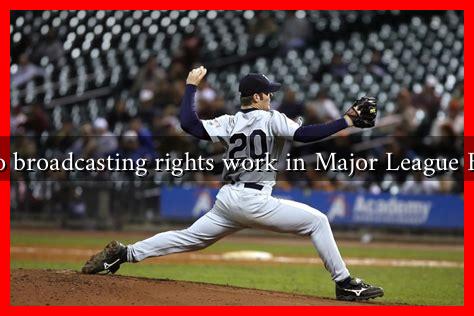-
Table of Contents
How Do Broadcasting Rights Work in Major League Baseball?
Broadcasting rights in Major League Baseball (MLB) are a complex and lucrative aspect of the sport, influencing how fans consume games and how teams generate revenue. Understanding the intricacies of these rights can provide valuable insights into the business side of baseball, the relationship between teams and networks, and the overall impact on the sport’s popularity.
The Basics of Broadcasting Rights
Broadcasting rights refer to the permissions granted to television and radio networks to air MLB games. These rights are typically negotiated in multi-year contracts and can vary significantly based on the market size, the popularity of the teams involved, and the specific terms of the agreement.
- Local Broadcasting Rights: Each MLB team has the ability to negotiate its own local broadcasting rights. This means that regional sports networks (RSNs) often air games for specific teams, allowing fans to watch their local favorites.
- National Broadcasting Rights: MLB also sells national broadcasting rights to major networks like ESPN, Fox, and TBS. These contracts cover a limited number of games that are broadcasted across the country.
The Financial Impact of Broadcasting Rights
Broadcasting rights are a significant source of revenue for MLB teams.
. In fact, the financial landscape of baseball has been transformed by lucrative broadcasting deals. For instance, the 2019 deal between MLB and ESPN was worth approximately $5.6 billion over eight years, showcasing the immense value of national broadcasting rights.
Local broadcasting deals can be even more lucrative. For example, the Los Angeles Dodgers signed a 25-year, $8.35 billion deal with SportsNet LA in 2013, which has been one of the most significant local broadcasting contracts in sports history. Such deals allow teams to invest in player salaries, facilities, and other operational costs.
How Broadcasting Rights Are Negotiated
The negotiation process for broadcasting rights can be intricate and competitive. Here are some key factors that influence these negotiations:
- Market Size: Teams in larger markets, such as New York or Los Angeles, often command higher broadcasting rights fees due to their larger fan bases.
- Team Performance: Successful teams tend to attract more viewers, which can drive up the value of their broadcasting rights.
- Network Competition: The presence of multiple networks vying for broadcasting rights can lead to higher bids and better terms for teams.
The Role of Streaming Services
In recent years, streaming services have begun to play a significant role in the broadcasting landscape. Platforms like YouTube TV, Hulu, and MLB’s own streaming service, MLB.TV, have changed how fans access games. This shift has prompted MLB to explore new broadcasting agreements that include streaming rights.
For example, in 2020, MLB announced a partnership with YouTube to stream select games, marking a significant step towards integrating digital platforms into traditional broadcasting models. This trend is likely to continue as younger audiences increasingly prefer streaming over traditional cable.
Case Studies: Successful Broadcasting Deals
Several case studies highlight the success of broadcasting deals in MLB:
- New York Yankees and YES Network: The Yankees’ partnership with YES Network has been highly profitable, generating substantial revenue through local broadcasting rights.
- Chicago Cubs and Marquee Sports Network: The Cubs launched their own network, Marquee, in 2020, allowing them to control their broadcasting rights and maximize revenue.
Conclusion
Broadcasting rights in Major League Baseball are a vital component of the sport’s financial ecosystem. From local deals that allow teams to connect with their communities to national contracts that bring games to a broader audience, these rights shape how fans experience baseball. As the landscape continues to evolve with the rise of streaming services, teams and networks must adapt to meet the changing preferences of viewers. Understanding these dynamics not only enhances our appreciation of the game but also highlights the intricate business strategies that underpin America’s pastime.
For more information on MLB broadcasting rights and their impact on the sport, you can visit the official MLB website at mlb.com.





